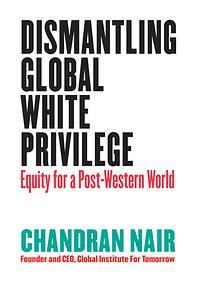Take a photo of a barcode or cover
I wrote a 4 and a half page review for this book for class, if you want to read it let me know haha
This is not a good book. The writer has good goals and presents many clear and relevant examples of white privilege throughout the non-Western world, particularly in cultural spheres like movies, fashion, music, education, especially business schools, but he consistently presents this as an evil just in itself, the result of sometimes overtly racist westerners, but just as often westerners unaware of how their actions benefit from and promote white privilege. This book tries to make them aware. In some ways, then, it is similar to White Fragility, even including a discussion guide at the end as if it were meant to be used in workshops and diversity training seminars.
The problem here is white privilege is presented as pervasive yet also as unconnected with any larger systems. It is an evil in itself and can be removed surgically, leaving the rest of the structure intact. He even lays out clear pathways for its removal, such as more concentration in universities on the advances and thought of the non-western world, in books published by presses operating in the non-western world, more opportunities for non-westerners in the fields of sports or movies or business, and so on.
But this ignores white supremacy's essential role in Western capitalism. The former will never just disappear on its own without dismantling the latter, regardless of how “self-aware” those who benefit from white privilege are. Continued profits for corporations and shareholders require the continued exploitation both of workers in the west but especially of workers and the natural resources of the Global South, and this necessitates the systematic promotion of white supremacy on the part of western governments and corporations. Acknowledging the skill levels of Indian cricket players and giving more attention to music or fashion that does not conform to Western tastes will not change that. He refers often to anti-racist thinkers and leaders like Malcolm X, and cites works like How Europe Underdeveloped Africa, but does not seem to have learned their lessons and steers clear of any of their more radical positions. As he says, he wants to “dismantle but not destroy.” But there is no ethical consumption under capitalism, and there is no Western capitalism without white supremacy. He should have quoted Fred Hampton: “We say you don't fight capitalism with black capitalism; you fight capitalism with socialism.”
The problem here is white privilege is presented as pervasive yet also as unconnected with any larger systems. It is an evil in itself and can be removed surgically, leaving the rest of the structure intact. He even lays out clear pathways for its removal, such as more concentration in universities on the advances and thought of the non-western world, in books published by presses operating in the non-western world, more opportunities for non-westerners in the fields of sports or movies or business, and so on.
But this ignores white supremacy's essential role in Western capitalism. The former will never just disappear on its own without dismantling the latter, regardless of how “self-aware” those who benefit from white privilege are. Continued profits for corporations and shareholders require the continued exploitation both of workers in the west but especially of workers and the natural resources of the Global South, and this necessitates the systematic promotion of white supremacy on the part of western governments and corporations. Acknowledging the skill levels of Indian cricket players and giving more attention to music or fashion that does not conform to Western tastes will not change that. He refers often to anti-racist thinkers and leaders like Malcolm X, and cites works like How Europe Underdeveloped Africa, but does not seem to have learned their lessons and steers clear of any of their more radical positions. As he says, he wants to “dismantle but not destroy.” But there is no ethical consumption under capitalism, and there is no Western capitalism without white supremacy. He should have quoted Fred Hampton: “We say you don't fight capitalism with black capitalism; you fight capitalism with socialism.”
informative
inspiring
reflective
medium-paced

